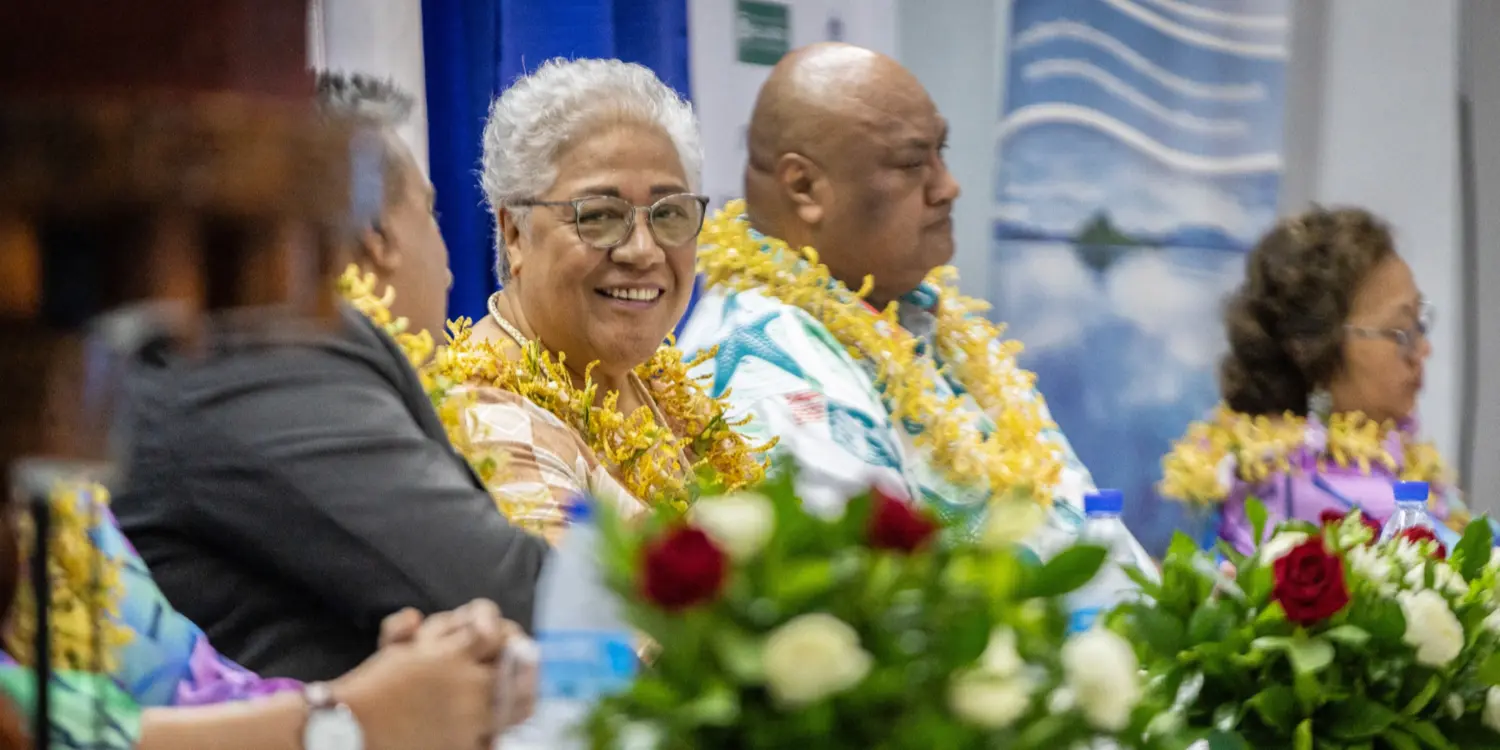Samoan Prime Minister, Fiame Naomi Mataafa described climate change as the biggest threat faced by the region as she gave her keynote address at the 4th Pacific Climate Change Conference on Tuesday.
Pacific leaders, organisations and experts from across the Pacific have gathered in Samoa this week to look at ways to overcome climate change.
Held at the National University of Samoa, it is guided by the theme, ‘Our Ocean, Our Home: Climate Resilience for a Blue Pacific’.
The multi-disciplinary conference is bringing together experts from the private, public, and civil society, and a variety of participants from the arts, faith communities, industry, and other backgrounds to look at ways where, together, we can all play our part to address climate change.
In her remarks, PM Mata’afa said the Pacific leaders had already declared that Pacific communities are facing a climate emergency threatening livelihoods, security and the wellbeing of people and ecosystems.
“Many of them already experience higher temperatures, shifts in rainfall patterns, rising sea levels and altered frequency and intensity of extreme climate events. Strong traditions, cultures, and adaptability to the unique characteristics of their environment and geography have fostered resilient communities over centuries. However, climate change poses a considerable threat to their future,” she said.
“Small Island Developing States (SIDS) face a unique set of vulnerabilities which impede their ability to achieve sustainable development. Most SIDS including Samoa face high indebtedness which is compounded every time there is rebuilding after a natural disaster. And we know that natural disasters will increase in frequency and severity as long as climate change remains unaddressed.”
Mata’afa also highlighted the latest Intergovernmental Panel of Climate Change (IPCC) report which showed that based on the current trajectory, the intensity and frequency of extreme weather events, rising sea levels, global warming, and ocean acidification will increase.
The IPCC Regional Factsheet for Small Islands also showed that changes in the environment were already and would continue to be the single greatest threat to the security and well-being of Pacific people.
“This is why meetings like the PCCC are crucial for the survival of Pacific communities,” she added.
“We, the leaders of the Pacific, have been collectively calling to amplify ambitious global action to limit global warming below 1.5C in order for us to secure the future of our blue Pacific. We as Leaders, approved “The 2050 Strategy of the Blue Pacific Continent” as our “North Star” articulating our 30-year strategy that responds to the Pacific region’s important challenges in environment and sustainable development.
“The overall theme of the Fourth Pacific Climate Change Conference underlines the central role of the Pacific Ocean in the life of the communities in the region. It recognises that protection of the ocean is crucial to enable Pacific nations that depend on it to continue to thrive in their home environment.”
The Prime Minister of Tonga, Siaosi ‘Ofakivahafolau Sovaleni will arrive on Wednesday to join the conference.
SPREP’s Director General, Sefanaia Nawadra, said the PCCC was a platform to discuss and formulate concrete actions for the Pacific region to tackle climate change, as well as for SPREP to assist in building the resilience of our Pacific communities.
“The theme and the meeting this week speak volumes of the need for commitment and a dedicated space through this conference to share the science that we are doing and discuss what science is needed to better manage our Pacific Islands region to allow our Pacific Island communities to thrive and prosper,” he said.
“Climate and Disasters and Ocean and Environment are two of the thematic areas under the 2050 Blue Pacific Strategy our Leaders have put in place. SPREP and SPC lead both of these themes. A week ago, SPREP successfully re-convened after a hiatus of seven years the Pacific Climate Change Roundtable. We also now have the mandate to convene a Ministerial for Climate Change Ministers. This conference can be part of the regional architecture to implement these two themes of the 2050 Strategy to ensure the scientific voice is engaged in implementation and the strategy’s continual improvement and revision.
VUW’s Assistant Vice Chancellor Pasifika, Associate Professor Luamanuvao Dame Winnie Laban, said the PCCC provided a platform to promote sustainable solutions and innovations for mitigating and adapting to climate change in the Pacific region, as well as to advocate for global climate action and the reduction of greenhouse gas emissions.
“Responding to climate change is all about cooperation. We need to work together to help each other, this is especially true across the Pacific, including our Ocean, the biggest ocean in the world,” she said.
“Marrying traditional knowledge and western science is key to a broader understanding of the issues and the human response to them. This conference aims to foster the weaving of knowledge and we can each play a vital role in capacity building through our partnerships across the blue Pacific, our home.”
The Vice Chancellor and President of NUS, Professor Tuifuisa’a Patila Malua Amosa said she is pleased that the National University of Samoa is playing a key role in organising this conference in collaboration with our partners and as the Pacific work together to build climate resilience in the Pacific communities.
The conference is jointly organised by the National University of Samoa (NUS), the Pacific Climate Change Centre (PCCC) hosted at the Secretariat of the Pacific Regional Environment Programme (SPREP) and Te Herenga Waka – Victoria University of Wellington (VUW).













